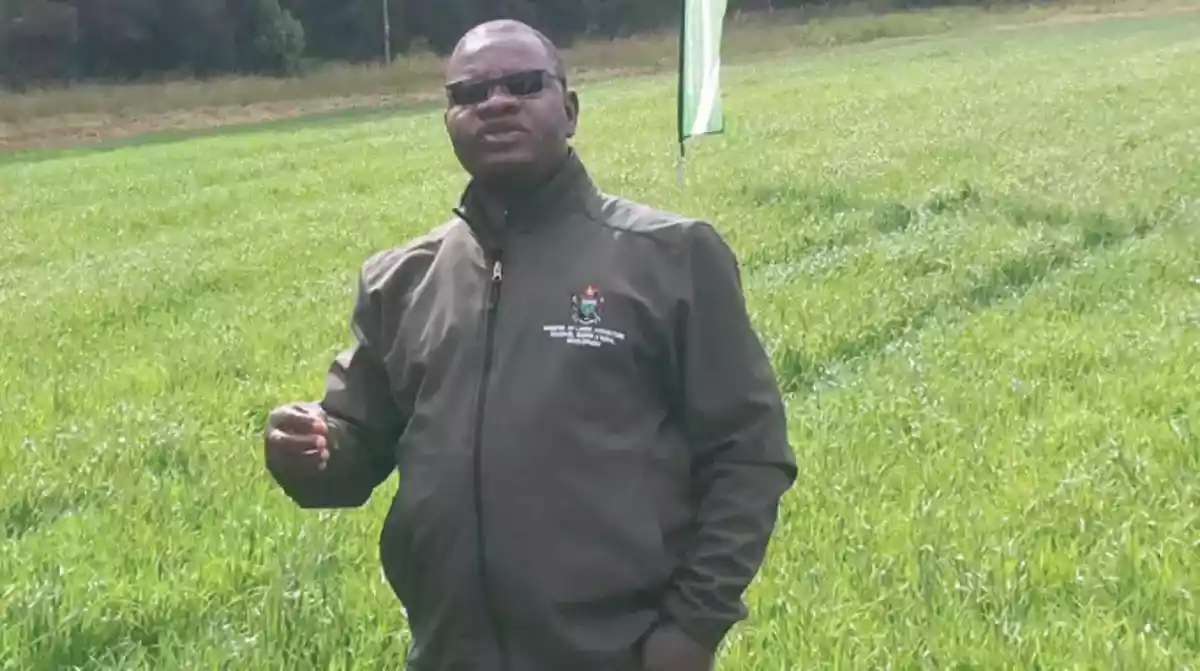
I first met Othnell ‘Mangoma’ Moyo in 2008 when he came to the Zimbabwe College of Music from Bulawayo to audition for a place as an instrumentalist. I was one of the judges. As soon as he held his drum and started beating it, I was blown away and told him straight away that he was shortlisted. We listed him as one of the people we were taking to Maputo, Mozambique on a project we called Umoja.
I had not heard such explosive traditional drumming before except one by Douglas Vambe on Zimbabwe Broadcasting Corporation (ZBC) radio and television which was played just before the news.
Before we delve into Othnell Mangoma Moyo, some of you might ask: Who is Douglas Vambe?
Vambe is the man behind the popular Jerusarema/Mbende drumbeat that accompanies news bulletins on ZBC radio and TV stations.
Born on August 8, 1938 in Magunje village, Uzumba District, Vambe made several strides with his drum.
In 2008, he went to the United Kingdom where he performed at the Birmingham International Arts Festival and he managed to share the stage with renowned R&B artist R. Kelly and Colombian sensation Shakira at the 2010 Fifa World Cup finals in South Africa.
Mbende/Jerusarema dance is a popular dance style practised by the Zezuru people in eastern Zimbabwe. It is performed mainly in pairs of a male and female dancer and the dance is popular among the Shona’s Zezuru people of Murehwa, Uzumba, Maramba and Pfungwe districts of Mashonaland East Province in Zimbabwe.
Vambe was commissioned to play the Mbende/Jerusarema drum-beat as a signature tune for the Rhodesia Broadcasting Corporation (RBC) (African Service) news bulletin in 1961 which later became ZBC in the early 1980’s. It became very popular as it alerted the nation whenever there was going to be news broadcasts.
- Cops Arrested For USD 10 Fraud
- Wife attempts to murder husband’s lover
- Accountant in court for US$52K fraud
- ED challenger further detained
Keep Reading
In 1999, national broadcaster, ZBC, did the unthinkable: they dropped the popular Jerusarema/Mbende drums which introduced and concluded every news bulletin on radio and television.
Naturally, the decision caused a public outcry from viewers across the country forcing ZBC to re-instate the drums within a few days.
The drums, designed and performed by the late legendary drummer Douglas Vambe, had asserted their popularity.
ZBC said that it was in the process of modernising the news soundtrack, but it is rumoured that Vambe had started to demand payment for the use of his signature tune on ZBC news that a decision to drop the drum-beat was made.
But despite the earlier resistance, ZBC remained resolute on “modernising” the news soundtrack.
The news signature tune, which many jokingly referred to as “ngundu ngundu” after the sound of the drums, was finally given a tweak in 2016. Renowned guitarist, Clive ‘Mono’ Mukundu, added some keyboard sounds and guitar work to Vambe’s drums to produce a lukewarm sound. (I am not sure whether Mukundu received a one-off payment or is receiving royalties for his work).
Alistair Sibanda, a regular sports commentator in Bulawayo had this to say after the change in ZBC's drumbeat: “What ZBC did in changing the news drums for an exotic sound is repulsive. It’s like trying to rebuild Great Zimbabwe (monuments) using bricks and cement.”
Vambe had not received any material reward since the drumbeat was recorded at the then RBC Mbare studios, Harare, in 1961. He was obviously not clear about how copyright law works. As a result he received nothing until someone at Zimbabwe Music Rights Association (ZIMURA) alerted him about his rights. It was in 2009 when the government finally gave him a 100 hectare farm as compensation for his work, 48 years after the drumbeat was recorded.
The drumbeat had been on the airwaves since then until 2016 when the national broadcaster decided to change it.
However, on the downside, Vambe had challenges in protecting his artistic work or fighting for fair remuneration. He made several futile efforts to engage authorities at both the RBC and its successor, ZBC, to be paid royalties.
He was moved from one office to the other as the national broadcaster avoided paying him. At one time, the late Vambe demanded Z$5 million from ZBC as compensation without any success.
Local daily newspaper, NewsDay, reported that the late drummer’s efforts hit a brick wall when it was discovered that he had no copyright to the Mbende/Jerusarema beat.
The Uzumba-born drummer’s biggest folly was probably when he forfeited his rights over the news bulletin signature tune by opting for a one-off payment.
A family spokesperson had this to say: “The one-off payment was too little to a point that one can say they didn’t want to give him money. Remember, we are talking about a national heritage,” he said.
At the time of his death on August 1 in 2018 Vambe was still in dispute with ZBC.
However, should ZBC want to change its news bulletin signature tune anytime soon, a new drum replacement is waiting in the wings. There is no doubt that Mangoma will do the job well, if not better.
In Maputo ‘Mangoma’ sent audiences into a trance. He was equally explosive and everybody who heard him play commented that Zimbabwe had a national treasure in ‘Mangoma’. After Douglas Vambe, he is certainly the new kid on the block.
His curriculum vitae speaks of a legend living amongst us whose journey and impact in the global creative and cultural space has not been fully appreciated and comprehended especially in his home-country.
He was involved in cultural programmes in Botswana from 2007-2009 under Simba Arts (as musician dancer and actor and making Djembes for sale). He was also involved in Umoja as mentioned earlier.
He also played in Johannesburg South Africa alongside Sandra Ndebele, Sam Mtukudzi and Willom Tight in February 2008 as a percussionist.
He was taught to play marimba (xylophone) and ngoma (drums) by his brother Oswald Moyo at a very tender age and ventured into arts in 2001 at the iconic Amakhosi Township Square Cultural Centre in Bulawayo which was founded by Cont. Mhlanga.
Mangoma, a bonafide national treasure plays folklore instruments and collaborates with a lot of Zimbabwean and International Artistes. He has represented Zimbabwe in over thirty countries and in over 400 international festivals and venues. He has also been part of a record-breaking number of international musical collaborations.
In 2016 he was selected to participate in the US based One-Beat programme in which musicians from all over the world come together to form one beat in collaborative projects designed to make a positive impact on local and global communities.
The origin of music news themes can be traced all the way back to when film studios began incorporating music and sounds in newsreels. The music says a lot about the network and even the newscast it introduces — even if most viewers might not notice it.
Composer Joel Beckerman calls news music the “silent player” of TV newscasts and says it helps viewers understand stories. Beckerman runs a studio called Man Made Music in Manhattan, USA, where he has composed tunes for several brands and networks including NBC, CNBC, and AT&T.
BBC composer David Lowe believes news themes play a more functional role — to alert viewers. “It can’t have the same sort of emotional impact that other music has, but the general idea of news music on TV is to basically tell them that the news is on,” he said.
This, I guess, is where ZBC got the concept of news bulletin signature from and decided to give it an African flavour using Vambe’s drum-beat.
While music news origins can be traced to the nickelodeon era when live piano players played along with the movies, network news jingles didn’t become mainstream until the 1980s.
But news themes elsewhere in the world have changed a lot over the years. For one thing, they have become shorter. Long opens and closes are a thing of the past. Viewers are now hearing more and more bits of sound throughout a broadcast. These sounds are called music cues.
The inspiration for music news scores can come from a variety of places. A music composer might be inspired by things people might not necessarily think of as just music. Not many Zimbabweans think that the “ngundu ngundu” which introduces news bulletins is music. However, it is captivating.
Networks like ZBC are responsible for reporting music usage. They are supposed to do this through submitting cue sheets to music writers’ performing rights organisations like Zimbabwe Music Rights Association, American Society of Composers, Authors and Publishers, Music Publishers Association and Performing Rights Society. These organisations then send royalty cheques directly to members.
Oh! What a vicious circle!
Feedback: [email protected]










